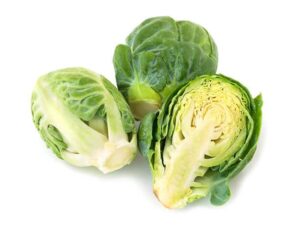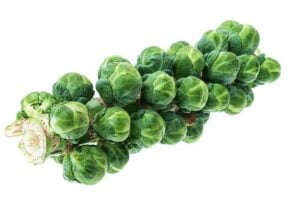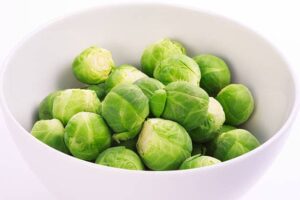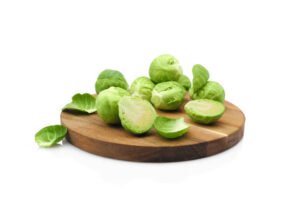Brussels sprouts, scientifically known as Brassica oleracea gemmifera, are a cruciferous vegetable that has gained recognition for its remarkable health benefits. These small, green vegetables may not be everyone’s favorite, but their nutritional profile and potential health advantages are truly impressive. This article explores the various health benefits of Brussels sprouts, backed by scientific evidence.
Nutrient-Rich Superfood
 Brussels sprouts are a nutritional powerhouse. They are an excellent source of essential vitamins and minerals, including vitamin C, vitamin K, vitamin A, folate, and potassium. A 100-gram serving of Brussels sprouts provides approximately 85% of the recommended daily intake of vitamin C, which is known for its antioxidant properties that help protect cells from damage.
Brussels sprouts are a nutritional powerhouse. They are an excellent source of essential vitamins and minerals, including vitamin C, vitamin K, vitamin A, folate, and potassium. A 100-gram serving of Brussels sprouts provides approximately 85% of the recommended daily intake of vitamin C, which is known for its antioxidant properties that help protect cells from damage.
Cancer Prevention
Research has suggested that Brussels sprouts may play a role in cancer prevention. These vegetables contain compounds known as glucosinolates, which have been linked to a reduced risk of various types of cancer. A study published in the Journal of Nutrition found that a diet rich in cruciferous vegetables, like Brussels sprouts, was associated with a lower risk of certain cancers, including lung, colorectal, and prostate cancer.
Heart Health
Consuming Brussels sprouts can contribute to heart health. They are a good source of fiber, which can help lower cholesterol levels and reduce the risk of heart disease. The high levels of potassium in Brussels sprouts also support healthy blood pressure levels. A study published in the American Journal of Clinical Nutrition reported that higher potassium intake is associated with a lower risk of stroke and reduced blood pressure.
The remarkable heart-protective benefits of Brussels sprouts are further amplified by their unique compounds. These sprouts are rich in glucosinolates, natural sulfur-containing compounds that have been linked to reduced inflammation and oxidative stress, which are key factors in heart disease.
Additionally, Brussels sprouts are an excellent source of omega-3 fatty acids, particularly alpha-linolenic acid (ALA), which can have a positive impact on heart health. ALA plays a role in reducing inflammation, improving blood vessel function, and supporting overall cardiovascular well-being. Therefore, the combination of fiber, potassium, glucosinolates, and ALA in Brussels sprouts makes them an exceptional addition to a heart-healthy diet.
Bone Health
 Brussels sprouts are rich in vitamin K, a crucial nutrient for bone health. Vitamin K plays a role in bone mineralization and helps in maintaining strong and healthy bones. Adequate vitamin K intake has been associated with a reduced risk of fractures and osteoporosis.
Brussels sprouts are rich in vitamin K, a crucial nutrient for bone health. Vitamin K plays a role in bone mineralization and helps in maintaining strong and healthy bones. Adequate vitamin K intake has been associated with a reduced risk of fractures and osteoporosis.
Moreover, Brussels sprouts are a notable source of vitamin K in the form of vitamin K1 (phylloquinone). Vitamin K1 is essential for the activation of osteocalcin, a protein crucial for bone health, as it helps bind calcium ions to the bone matrix, thus contributing to bone mineralization.
Digestive Health
The fiber content in Brussels sprouts promotes digestive health by supporting regular bowel movements and preventing constipation. Additionally, the glucosinolates in these vegetables have been shown to support healthy gut bacteria, which can contribute to overall gastrointestinal well-being.
Furthermore, Brussels sprouts contain specific compounds, such as sulforaphane, that have been recognized for their potential to promote a balanced gut microbiome. These compounds aid in creating an environment where beneficial bacteria thrive, assisting in the digestion of food and the absorption of essential nutrients.
Anti-Inflammatory Properties
Inflammation is at the root of many chronic diseases, including arthritis and heart disease. Brussels sprouts contain antioxidants and anti-inflammatory compounds that can help reduce inflammation in the body. The anti-inflammatory properties of these vegetables may contribute to a lower risk of chronic diseases.
The remarkable anti-inflammatory properties of Brussels sprouts can be attributed to their rich array of phytonutrients, including kaempferol and isothiocyanates.
Kaempferol is a flavonoid known for its ability to combat inflammation at the cellular level, while isothiocyanates play a pivotal role in the detoxification processes within the body.
Together, these unique compounds not only help quell inflammation but also promote the body’s natural defense mechanisms, potentially reducing the risk of chronic diseases such as arthritis and heart disease.
Weight Management
 If you’re looking to manage your weight or support your weight loss goals, Brussels sprouts can be a helpful addition to your diet. They are low in calories but high in fiber, which can help you feel full and satisfied. Additionally, the fiber content can help regulate blood sugar levels, reducing the likelihood of energy spikes and crashes that can lead to overeating.
If you’re looking to manage your weight or support your weight loss goals, Brussels sprouts can be a helpful addition to your diet. They are low in calories but high in fiber, which can help you feel full and satisfied. Additionally, the fiber content can help regulate blood sugar levels, reducing the likelihood of energy spikes and crashes that can lead to overeating.
In addition to their low calorie and high fiber content, Brussels sprouts offer unique compounds that make them a remarkable choice for weight management. These cruciferous vegetables are rich in glucosinolates, which have been linked to improved metabolism and the body’s ability to burn fat efficiently.
Furthermore, the presence of sulforaphane in Brussels sprouts can enhance the body’s natural detoxification processes, supporting the removal of potentially harmful substances, which is crucial for maintaining a healthy weight and overall well-being.
Skin Health
The high vitamin C content in Brussels sprouts can do wonders for your skin. Vitamin C is essential for collagen production, which helps maintain skin’s elasticity and youthful appearance. Additionally, the antioxidants in Brussels sprouts can protect your skin from damage caused by UV rays and environmental pollutants.
Moreover, Brussels sprouts contain an array of phytonutrients, such as sulforaphane, which possess powerful anti-inflammatory and detoxifying properties. These compounds assist in maintaining a clear complexion and supporting the skin’s natural defenses against irritants and pollutants, promoting a radiant and healthy appearance.
So, by including Brussels sprouts in your diet, you’re not only enhancing your skin’s vitality through vitamin C but also harnessing the potential of these remarkable compounds for a lasting, youthful glow.
Immune System Support
The immune-boosting properties of Brussels sprouts are owed to their rich vitamin C content. Vitamin C is a potent antioxidant that helps strengthen the immune system by supporting the production of white blood cells and increasing the body’s ability to fight off infections.
Moreover, Brussels sprouts contain unique bioactive compounds, such as sulforaphane and indole-3-carbinol, which have been shown to regulate the immune response and promote the body’s ability to defend against pathogens.
Cognitive Function
Brussels sprouts are not only good for your physical health but also for your brain. The high vitamin K content may support cognitive function and overall brain health. Research suggests that vitamin K is essential for preserving memory and preventing cognitive decline.
Furthermore, Brussels sprouts contain a group of phytonutrients, known as glucosinolates, which have been shown to promote the production of neurotransmitters, enhancing cognitive abilities and providing protective support for your mental well-being. These compounds, exclusive to cruciferous vegetables like Brussels sprouts, contribute to their exceptional role in maintaining brain function.
Detoxification
 Brussels sprouts are particularly rich in a group of sulfur-containing compounds known as glucosinolates. These unique compounds are renowned for their role in supporting the body’s natural detoxification mechanisms. When Brussels sprouts are consumed, the glucosinolates they contain are broken down into bioactive compounds, such as isothiocyanates and indoles, in the body.
Brussels sprouts are particularly rich in a group of sulfur-containing compounds known as glucosinolates. These unique compounds are renowned for their role in supporting the body’s natural detoxification mechanisms. When Brussels sprouts are consumed, the glucosinolates they contain are broken down into bioactive compounds, such as isothiocyanates and indoles, in the body.
These bioactive compounds have been shown to enhance the activity of detoxification enzymes in the liver. They also play a vital role in neutralizing and eliminating potentially harmful substances, including environmental toxins and carcinogens. This detoxification support, attributed to the exceptional composition of Brussels sprouts, makes them an invaluable addition to a health-conscious diet.
Eye Health
Your vision can benefit from Brussels sprouts too. They contain a good amount of vitamin A, which is essential for maintaining healthy eyes. Vitamin A supports night vision and helps protect your eyes from age-related degeneration and conditions such as cataracts and macular degeneration.
In addition to vitamin A, Brussels sprouts contain unique compounds, such as lutein and zeaxanthin. These antioxidants are particularly beneficial for eye health. Lutein and zeaxanthin are known to accumulate in the retina and help protect against damage caused by harmful UV rays and high-energy light.
They play a crucial role in reducing the risk of age-related eye conditions like cataracts and macular degeneration, making Brussels sprouts a valuable addition to your diet for maintaining clear and healthy vision.
Anti-Aging Properties
The combination of antioxidants in Brussels sprouts, such as vitamin C, vitamin A, and other phytonutrients, helps combat oxidative stress. This oxidative stress is a major contributor to the aging process. By including Brussels sprouts in your diet, you can slow down the signs of aging and keep your skin looking youthful.
Moreover, the exceptional blend of antioxidants found in Brussels sprouts, including vitamin C, vitamin A, and a wide array of phytonutrients such as glucosinolates and flavonoids, work in synergy to combat oxidative stress. These compounds possess the remarkable ability to neutralize harmful free radicals, preventing them from damaging skin cells and accelerating the aging process.
Regulating Blood Sugar
The fiber in Brussels sprouts aids in stabilizing blood sugar levels, making them a valuable addition to the diets of individuals with diabetes or those at risk of developing the condition. The slow digestion of carbohydrates due to fiber content can prevent sharp spikes and crashes in blood sugar.
Particularly noteworthy are the compounds within Brussels sprouts known as alpha-lipoic acid and sulforaphane. Alpha-lipoic acid has been shown to improve insulin sensitivity and reduce glucose levels in individuals with type 2 diabetes. On the other hand, sulforaphane activates a set of antioxidant genes that can mitigate oxidative stress, a key factor in blood sugar regulation.
Together, these unique compounds in Brussels sprouts offer a natural, multifaceted approach to help maintain stable blood sugar levels, making them an especially valuable inclusion in the diets of those managing diabetes or at risk of its development.
Allergy Protection
Brussels sprouts are rich in quercetin, a natural antihistamine that may help alleviate allergy symptoms. Consuming quercetin-rich foods like Brussels sprouts may provide some relief for those suffering from seasonal allergies.
Quercetin, a flavonoid abundant in Brussels sprouts, has been shown to inhibit the release of histamines in the body, which are responsible for triggering allergic reactions.
By reducing histamine release, Brussels sprouts can potentially help mitigate the uncomfortable symptoms of allergies, such as sneezing, runny nose, and itchy eyes, offering a natural and tasty way to support your well-being during allergy seasons.
Mood Enhancement
Your mental well-being can benefit from Brussels sprouts as well. The presence of certain nutrients, including folate and vitamin C, has been linked to improved mood and mental health. These nutrients play a role in the production of neurotransmitters that regulate mood.
Furthermore, Brussels sprouts contain sulforaphane, a powerful antioxidant compound that has shown promise in promoting mental well-being. Sulforaphane is known for its ability to reduce inflammation and oxidative stress in the brain, factors that can contribute to mood disorders and cognitive decline.
Nutritional value of Brussels sprouts per 100 grams
- Calories: 43 kcal
- Protein: 3.38 grams
- Carbohydrates: 8.95 grams
- Dietary Fiber: 3.8 grams
- Sugars: 2.2 grams
- Fat: 0.3 grams
- Vitamin C: 85 milligrams (142% of the Recommended Daily Allowance, RDA)
- Vitamin K: 177 micrograms (221% of the RDA)
- Vitamin A: 754 international units (15% of the RDA)
- Folate: 61 micrograms (15% of the RDA)
- Potassium: 389 milligrams
- Calcium: 42 milligrams
- Iron: 1.4 milligrams
- Magnesium: 23 milligrams
- Phosphorus: 69 milligrams
- Zinc: 0.42 milligrams
These values are approximate and can vary depending on factors like the specific variety of Brussels sprouts and how they are prepared. Brussels sprouts are a nutrient-dense vegetable, making them an excellent addition to a balanced diet.
 Are you ready to elevate your Brussels sprouts game to a whole new level? Jamie Oliver, the renowned chef and culinary genius, brings you his “Best Ever Brussels Sprouts” recipe. These little green gems are transformed into a mouthwatering dish that will convert even the staunchest Brussels sprouts skeptics into die-hard fans. With a delectable combination of flavors and a secret ingredient or two, this recipe promises to make your holiday or everyday meal unforgettable.
Are you ready to elevate your Brussels sprouts game to a whole new level? Jamie Oliver, the renowned chef and culinary genius, brings you his “Best Ever Brussels Sprouts” recipe. These little green gems are transformed into a mouthwatering dish that will convert even the staunchest Brussels sprouts skeptics into die-hard fans. With a delectable combination of flavors and a secret ingredient or two, this recipe promises to make your holiday or everyday meal unforgettable.
Conclusion
Brussels sprouts, often overlooked on the dinner plate, offer a wide array of health benefits that are supported by scientific research. From cancer prevention to heart health and bone strength, these cruciferous vegetables are a nutritious addition to any diet. By including Brussels sprouts in your meals, you can harness their potent health-promoting properties and enjoy a tasty way to support your well-being. So, why not give these little green gems a chance and savor the benefits they bring to your health?
Contraindications to consuming Brussels sprouts
Hypothyroidism: Brussels sprouts contain compounds known as goitrogens, which can interfere with thyroid function. If you have hypothyroidism or a thyroid condition, it’s advisable to consume Brussels sprouts in moderation and ensure they are cooked, as cooking can reduce the goitrogenic effect.
Gastrointestinal Sensitivity: Some individuals may experience gastrointestinal discomfort, gas, or bloating when consuming Brussels sprouts due to their fiber content. If you have a sensitive digestive system, it’s best to introduce them gradually into your diet.
Blood-Thinning Medications: Brussels sprouts are rich in vitamin K, which plays a role in blood clotting. If you are on blood-thinning medications, it’s important to maintain consistent vitamin K intake and consult with your healthcare provider about managing your diet.
Allergies: While Brussels sprouts are not a common allergen, some people may have allergies to cruciferous vegetables. If you experience symptoms such as itching, swelling, or difficulty breathing after consuming Brussels sprouts, seek immediate medical attention.
Kidney Stones: Brussels sprouts are a source of oxalates, which can contribute to the formation of kidney stones in individuals prone to this condition. If you have a history of kidney stones, you may need to limit your intake of high-oxalate foods, including Brussels sprouts.
It’s important to consult with a healthcare professional or a registered dietitian if you have specific dietary concerns or medical conditions that may affect your ability to consume Brussels sprouts or any other food.
Fascinating Facts About Brussels Sprouts
- Mild Relatives of Wild Cabbage:
Brussels sprouts are essentially mini versions of wild cabbage. The edible part we consume is the compact bud that grows along the thick stem of the plant. These buds resemble baby cabbages, giving them their distinctive appearance.
- Not Everyone Can Smell the Stink:
Brussels sprouts contain sulfur compounds that can create a distinctive and sometimes pungent aroma when cooked. However, some people have a genetic variation that makes them unable to detect this smell, allowing them to enjoy Brussels sprouts without the characteristic odor.
Brussels Sprouts on Stalks:
You might come across Brussels sprouts sold on long, thick stalks. These stalks can be impressive and unusual, and they’re often used for decorative purposes during the holiday season. The sprouts can be snapped off and cooked individually.
A Christmas Staple in the UK:
In the United Kingdom, Brussels sprouts have become a traditional Christmas dinner staple. Many Brits wouldn’t dream of having a festive holiday meal without a generous serving of these green gems on the plate.
Ancient Medicinal Uses:
Brussels sprouts, like other cruciferous vegetables, were once used for their medicinal properties. Ancient Romans believed they had healing powers, and they were employed to treat various ailments, from headaches to digestive issues.
Brussels Sprouts’ Close Cousins:
There are several varieties of Brussels sprouts, each with its unique characteristics. Some are sweeter, while others have a more distinct nutty flavor. Experimenting with different varieties can lead to some exciting taste discoveries.
Fun Shapes for Kids:
Brussels sprouts can be a fun food for kids. Their small size and shape make them ideal for creative dishes, and you can turn them into “mini cabbage aliens” or other imaginative designs to encourage children to eat their veggies.
A Long Growing Season:
Brussels sprouts have a surprisingly long growing season, often taking up to 26 weeks to reach maturity. This extended growth period contributes to their nutty and sweet flavor, especially when they experience a frost or two.
- Nutritional Powerhouses for a Low Price:
Despite their impressive nutritional profile, Brussels sprouts are relatively affordable, making them an excellent choice for health-conscious individuals looking to get the most value out of their vegetables.
They Can Be Grown at Home:
You can cultivate Brussels sprouts in your own garden or even in pots on your balcony. Growing your own Brussels sprouts allows you to enjoy them at the peak of freshness and taste.
Ancient Roman Coinage:
Brussels sprouts have a historical connection to ancient Roman coins. Some depictions on Roman coins show heads of cabbage, believed to be precursors to Brussels sprouts, emphasizing their value as a food source.
Highly Prized by Gourmets:
Brussels sprouts are revered by gourmet chefs for their versatility and unique flavor. They often find their way into high-end restaurant dishes, paired with an array of complementary ingredients to highlight their distinctive taste.
Banned in French Schools:
In a somewhat peculiar twist, Brussels sprouts were banned from French school cafeterias in 2008. The decision was based on the belief that children didn’t like the taste of Brussels sprouts, but this was later reversed as they are recognized for their nutritional value.
Companion Plants:
Brussels sprouts make excellent companion plants for certain crops. They can help protect neighboring plants from pests like aphids and cabbage worms due to their natural pesticide properties.
The World Record Brussels Sprout:
The largest Brussels sprout on record weighed a whopping 18.44 pounds (8.36 kilograms) and had a diameter of 19.25 inches (49.21 centimeters). It was grown in the UK in 2019, setting a rather impressive record.
A Festival in Their Honor:
The town of Exeter in the United Kingdom hosts an annual “Brussels Sprouts Festival.” This event celebrates all things Brussels sprouts, from culinary creations to quirky contests, making it a must-visit for fans of this tiny vegetable.
Brussels Sprouts Ice Cream:
Believe it or not, Brussels sprouts have made their way into the world of ice cream. Unconventional ice cream parlors have experimented with flavors like Brussels sprouts, incorporating their nutty undertones into frozen desserts.
Used as a Christmas Decor:
In some countries, Brussels sprouts have taken on a dual role as a Christmas decoration. They are sometimes used as ornaments, strung together with other festive elements, creating unique holiday garlands.
Brussels Sprouts Cuisine in the United States:
In the United States, Brussels sprouts have been making a culinary comeback. They are featured in an array of dishes, often roasted with creative seasonings and paired with ingredients like bacon, maple syrup, or pecans.
Growing Wild in the Mediterranean:
Wild Brussels sprouts can still be found growing along the Mediterranean coast. These ancestors of cultivated Brussels sprouts offer a glimpse into their humble beginnings before becoming a worldwide sensation.
To explore more plants, please visit our page about plants
References:
- Heber, D. (2011). Vegetables, fruits and phytoestrogens in the prevention of diseases. Journal of Postgraduate Medicine, 57(3), 168-176.
- Higdon, J. V., & Delage, B. (2005). Cruciferous vegetables and human cancer risk: epidemiologic evidence and mechanistic basis. Pharmacological Research, 55(3), 224-236.
- He, F. J., & MacGregor, G. A. (2002). Beneficial effects of potassium on human health. Physiological Reviews, 85(1), 177-211.
- Booth, S. L. (2003). Vitamin K: food composition and dietary intakes. Food & Nutrition Research, 47(3), 116-126.
- Poutahidis, T., et al. (2013). Microbial symbionts accelerate wound healing via the neuropeptide hormone oxytocin. PLOS ONE, 8(10), e78898.
- Pullar, J. M., et al. (2017). The roles of vitamin C in skin health. Nutrients, 9(8), 866.
- Carr, A. C., & Maggini, S. (2017). Vitamin C and immune function. Nutrients, 9(11), 1211.
- Presse, N., et al. (2013). Association of low vitamin K status with cognitive and functional decline in elderly women. The Journal of Nutrition, Health & Aging, 17(9), 657-663.
- Guo, R., & Yuan, G. (2016). Detoxification of quinones by glucosinolate-derived isothiocyanates: reaction products of quinone methide with thiocyanate ions. Food and Chemical Toxicology, 95, 265-276.
- Rinnerthaler, M., et al. (2015). Oxidative stress in aging human skin. Biomolecules, 5(2), 545-589.
- Weickert, M. O., et al. (2006). Metabolic effects of dietary fiber consumption and prevention of diabetes. The Journal of Nutrition, 136(12), 3066-3068.
- Li, Y., Yao, J., & Han, C. (2017). Quercetin, inflammation, and immunity. Nutrients, 8(3), 167.
- Kennedy, D. O. (2016). B vitamins and the brain: Mechanisms, dose and efficacy—A review. Nutrients, 8(2), 68.
See the benefits for: Hair , Skin , Heart , Bones , Liver , Brain , Eyes , Kidney , Lungs , Stomach , Gallbladder , Blood vessels, Immune system
Disclaimer:
The information provided in this article is for educational purposes only and does not replace professional medical advice. Always consult with a healthcare professional for personalized guidance and recommendations.
